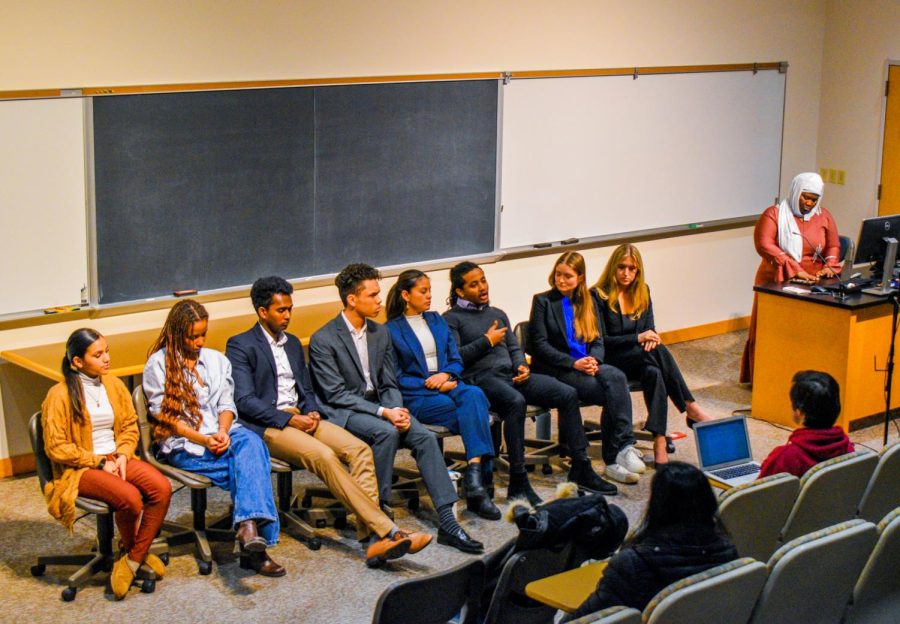On Thursday night, members of the administration and the general student body caught a glimpse of the Student Government candidates and their policies during a panel in Oechsle Hall that was co-sponsored by Student Government and The Lafayette. Voting for the Executive Board of Student Government began today and will run through Tuesday, Feb. 14.
Three candidates are running for president: incumbent Matwos Tadesse ‘24, Anna Fenkel ‘25 and Olivia Puzio ‘25. The rest of the candidates ran unopposed; Jermaine Grant ’25 dropped out of the race for Inclusivity Officer on Thursday. Thania Hernandez ’25, Mariama Bah ‘24, Areeb Atheeque ‘25, Trebor Maitin ‘24 and Nazary Gonzalez ’24 will be Vice President, Inclusivity Officer, Treasurer, Parliamentarian and Communications Officer, respectively.
Candidates were first asked to share their general platform with the audience.
Both Puzio and Fenkel proposed opening portions of the General Body meetings to students outside of Student Government officers. This would allow clubs to be better informed and represented on campus, they said.
“I want the Student Government and students to be a more cohesive unit,” Fenkel said. “I’d do this through restructuring our budgeting structure, and opening a portion of our student body meetings to outside voices.”
Puzio’s platform was based on her slogan “transparency, support and initiative.” She added that “everyone should be able to feel supported and safe on campus.”
Tadesse centered his platform on building relationships with the administration and the board of trustees.
Tadesse said that his work with the Lafayette Today and his monthly meetings with President Nicole Hurd have made Student Government a driving force of campus.
“We’ve been creating opportunities in terms of connecting with [the board of] trustees. We’re going to have a whole dinner with a lot of the student body to be able to let them express their concerns in the future,” he said.
A key topic surrounded how Student Government can improve its influence on campus.
“Around thirty percent of the freshman and sophomore students that I talked to [didn’t] know that Student Government is out there,” Hernandez said. “The main thing is putting a face to the organization, so that things like budgeting and other issues are transparent. Students could know how the processes work and how they can be more involved.”
Another key issue included the controversy of club sports funding. The panel revealed how some organizations, such as ski and crew, consistently violate Student Government financial guidelines of each club getting a maximum of $12,000 a year.
“These clubs give an excess of $50,000 a year,” Atheeque said.
He proposed that the college assume some of these costs.
Puzio backed this position. She proposed sharing club sport costs with Student Government, Recreation Services and the college, but noted that in case the administration rejected this proposal, that the funding of club sports via Student Government would not stop completely.
“I’m the Student Organizations director right now, and they are the lifeblood of our campus. And I can promise you that if I’m elected, I would one hundred percent vouch for every single club and organization on campus, because that’s what is important to me and the students. But I also don’t want to sit up here and make claims that I don’t know will work, so we need to look for other ways,” Puzio said.
Maitin, calling Student Government an “oligarchy” in its current from, said his first task in the new role of parliamentarian would be to review the election.
“I’d like to revamp elections to make them more active. Student Government elections are done by plurality voting, and my fellow candidates have to reach out more to people beyond just the very specific niches that they know they’re gonna get votes from,” Maitin said.
Lastly, the candidates turned to their qualifications and motivations for running for high office. Fenkel referenced four student organizations in which she works in leadership positions, such as her role as vice president of Kappa Kappa Gamma and an advisory member of Mock Trial.
“What sets me apart is my diverse leadership experience, and that I have a drive to really make things happen. If I have an idea and if I have a concept, I’ll make it happen all the time,” she said.
Finishing up his term as president, Tadesse said he was able to “gain a lot of institutional experiences, and also develop a lot of relationships which makes it easier to implement the initiatives that we’ve already started.” Under his administration, Maitin, Vice President Fatimata Cham ‘23 and Director of the Academic Affairs Committee Olivia Lattanzi ’23 spearheaded the new constitution and bylaws for Student Government this past semester.
Puzio addressed her loyalty to Student Government.
“You really need to allocate a lot of time to this position. If elected, I would be spending a majority of my time on being president. I’m willing to really listen to students,” she said.
The panel concluded with audience questions, many of which addressed Student Government’s visibility on campus, as well as the future of club sports funding.
Disclaimer: Managing editor Trebor Maitin ’24 is the Public Relations & Marketing director for Student Government and news editor Emma Chen ’24 is a representative on the Equity & Inclusion Committee. Neither contributed writing or reporting to this story.




























































































































